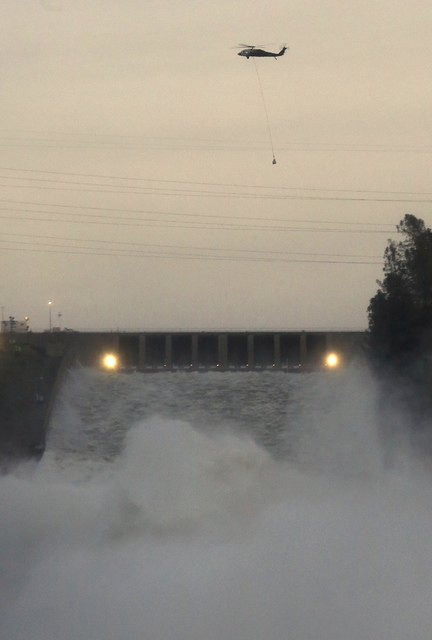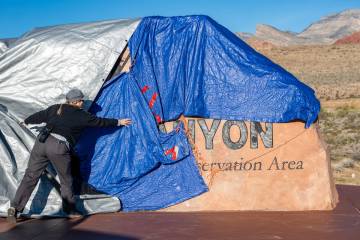Officials hope grazing sheep remove fire threat
CARSON CITY -- The hours are long, the working conditions can be hot and dirty, and the pay is nonexistent. But the food is nonstop.
Hundreds of sheep will spend the next six weeks or so devouring cheatgrass that covers one of the large hills overlooking Carson City, filling their stomachs as they remove a highly flammable summertime fire threat.
An agreement with the city, multiple state agencies and several private owners opened C Hill, identifiable by its huge "C" (for Carson City) and even larger American flag, to grazing in an effort to remove fuel for potential wildfires, said Ann Bollinger, the city's open space assistant.
Two bands of about 800 Merino-Rambouillet crossbreeds each will eat their way through the affected areas for about a month and a half, she said.
"Cheatgrass is so volatile," Bollinger said. "One cigarette can quickly cause (fire) to spread across a landscape, so it's crucial that it be controlled."
The sheep belong to Fernley resident Ted Borda, a high school math teacher and the owner of Borda Land and Sheep Co. His grandfather began ranching in 1915, and Borda said he was happy to take charge when his own father died.
Though dealing with any animal on such a large scale has challenges, sheep tend to be relatively easy to control, Borda said.
"Sheep are one of the few animals God made with no capacity for self-defense," he said. "A turtle can go into its shell, a snake can bite you. But when sheep get scared, they just gather into a big circle, so it's natural for them to stay together rather than going off in 800 different directions."
A procession of thousands of hooves could easily damage the land, but in many cases it's the best option for fire prevention, Bollinger said. Other methods of controlling flammable vegetation tend to be too expensive or otherwise impractical for the area around Carson City, she said.
"There's a chemical called Plateau that will work for a few years, but it's very expensive," she said. "You can also just use a mower, but that's very limited by topography. Cattle and sheep are the two best."
Because sheep are much smaller than cows, they are less likely to compact the soil and cause erosion problems, which means more animals can be released over a larger area, Bollinger said.
When the sheep finish their work in Carson City next month, Borda and his herders will pack them into special livestock trucks and move them to other pastures, he said. Depending on the weather and other factors, the flock is busy for much of the year, grazing on foliage across much of Nevada and Northern California.

















